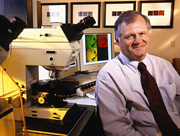JOHN S. TORDAY, MSC, PHD
 Professor of Pediatrics and Ob/Gyn, Harbor-UCLA, Division of Neonatology; Director, Guenther Laboratory for Cell-Molecular Biology
Professor of Pediatrics and Ob/Gyn, Harbor-UCLA, Division of Neonatology; Director, Guenther Laboratory for Cell-Molecular Biology
Tools and Techniques: cell & tissue culture; Western; PCR; immunohistology
Website: http://evolutionarymedicine.labiomed.org/
Email: jtorday@labiomed.org
Interests: cellular basis for the evolution of physiology; lung development; endocrinology; pathophysiology; developmental physiology; comparative physiology; molecular physiology; reproductive biology
Personal Statement:
“Life is that which can mix oil and water”- Robt. Frost, Notebook 8, pg.58r
I am a developmental physiologist with a strong interest in how and why physiology has evolved. My career in lung development was launched 4 decades ago by the serendipitous finding that a simple molecule like cortisol could effectively accelerate fetal lung development; this phenomenon changed reproductive medicine over-night, reducing the preterm infant mortality rate from as high as 70% to nearly zero for preterm births. As a working scientist this made no sense, but was impossible to ignore- why should hormones have anything to do with the respiratory system? On the other hand, such chance findings are largely the history of biomedical research. I think that such paradoxes prevail because we are using the wrong logic. The way to make biology and medicine rational and predictive is by reducing evolution to cell biology, as shown in my recently–published book Evolutionary Biology, Cell-Cell Communication and Complex Disease.
Simply put, by reducing the processes of biology and evolution to the cellular level and determining how development, homeostasis and regeneration function both within and across species phylogenetically is a level playing field for understanding the mechanisms involved in both- the trick is to reduce phenotypes of interest to the cell-molecular level, providing the insights to homology that will reveal the evolutionary strategies.
And for the sake of medical education and the generation of novel evolutionary medicine research intiatives, a cell-molecular approach allows us to interface evolutionary biology and evidence based medicine.
